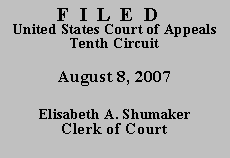

| UNITED STATES OF AMERICA, | |
| v. | |
| RANDALL A. CRISLER, |
Phillip P. Medrano, Assistant Federal Public Defender, Albuquerque, New Mexico, for Defendant - Appellant
.Larry Gómez, Acting United States Attorney and David N. Williams, Assistant United States Attorney, Albuquerque, New Mexico, for Plaintiff - Appellee
.
On October 9, 2003, Randall Crisler pleaded guilty before the United States District Court for the District of New Mexico to false personation of a officer or employee of the United States, see 18 U.S.C. § 912. He was sentenced on February 18, 2004, to three years on probation. As a special condition of the probation, Mr. Crisler was not to possess or consume alcohol. On April 5, 2006, a probation officer filed a petition alleging that Mr. Crisler had violated that condition on February 17.
The district court scheduled a hearing on the petition for June 15, 2006, but granted Mr. Crisler a continuance. At the rescheduled hearing on September 5, 2006, the court found that Mr. Crisler had violated his probation by consuming alcohol. It decided, however, not to revoke Mr. Crisler's probation. Instead, it said that it would "hold the petition in abeyance for a period of five months," R. Vol. III at 6, and it specified several new conditions of Mr. Crisler's continued probation, including that he was not to contact any past employers and that he would be subject to electronic monitoring of his alcohol consumption.
On February 27, 2007, a probation officer filed an "Amended Petition for Revocation of Supervised Release." R. Doc. 57. The entry on the petition for "Date Supervision Expires" is "02/17/2007," id., ten days earlier. The petition repeats the earlier allegation of an alcohol-related violation on February 17, 2006, and adds two alleged violations on February 18, 2007 (one day after expiration of the term of probation): sending an email to a former employer and removing an electronic alcohol monitor. At a hearing on March 7, 2007, Mr. Crisler argued that the court was without jurisdiction to consider the petition because his probation had expired on February 17. The Assistant United States Attorney responded that "the revocation hearing held on September 5, 2006, is pending." R. Vol. IV at 3. The court held that it had jurisdiction under 18 U.S.C. § 3565(c), found the allegations in the probation officer's petition to be true, revoked Mr. Crisler's probation, and sentenced him to 90 days' imprisonment and 12 months' supervised release. Mr. Crisler appeals.
Section 3565(c) states:
The power of the court to revoke a sentence of probation for violation of a condition of probation, and to impose another sentence, extends beyond the expiration of the term of probation for any period reasonably necessary for the adjudication of matters arising before its expiration if, prior to its expiration, a warrant or summons has been issued on the basis of an allegation of such a violation.
18 U.S.C. § 3565(c). In other words, the court cannot revoke probation after the term of probation has expired unless (1) the delay in revocation was reasonably necessary and (2) a warrant or summons issued before the expiration date. Neither condition was met here. It is undisputed that the amended petition for revocation was filed after the probation term had expired. And even if the "amended" petition is deemed to relate back to the original petition of April 5, 2006, with respect to the alcohol-related allegation, it was not "reasonably necessary" to delay revocation until after expiration of the term of probation. Although Mr. Crisler had sought a continuance of the originally scheduled hearing, the hearing was then conducted on September 5, 2006. To be sure, the district court "abated" the petition for an additional five months; but that period ended on February 5, 2007, within the probation term. The record contains absolutely no reason why the abated revocation proceeding could not have been conducted by the probation-expiration date of February 17, 2007. As for the two alleged violations on February 18, 2007, Mr. Crisler's probation had already ended a day earlier. The district court had never entered an order extending probation beyond the original three-year term.
Accordingly, we REVERSE the district court's revocation of Mr. Crisler's probation and remand with instructions to end his supervised release forthwith.
*.After examining the briefs and appellate record, this panel has determined unanimously to honor the parties' request for a decision on the briefs without oral argument. See Fed. R. App. P. 34(a)(2); 10th Cir. R. 34.1(G). The case is therefore ordered submitted without oral argument.